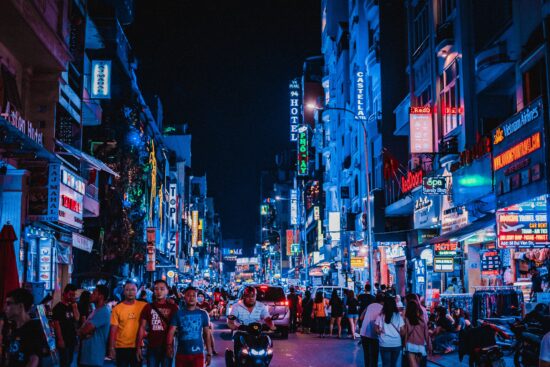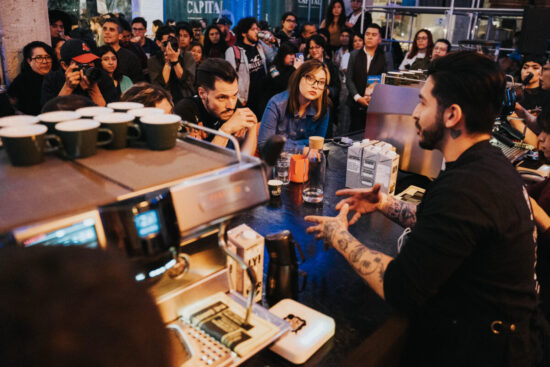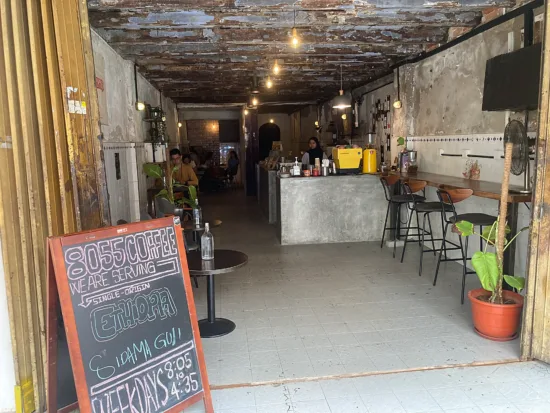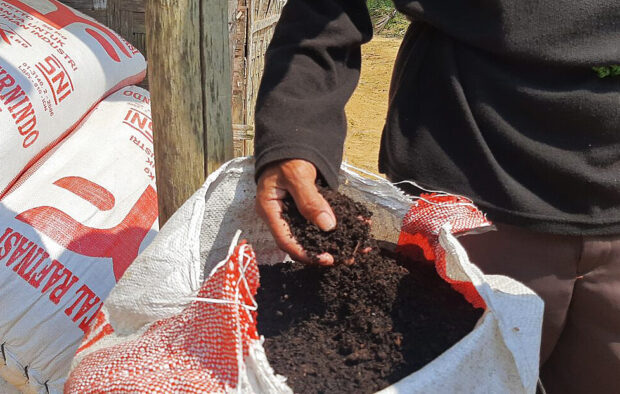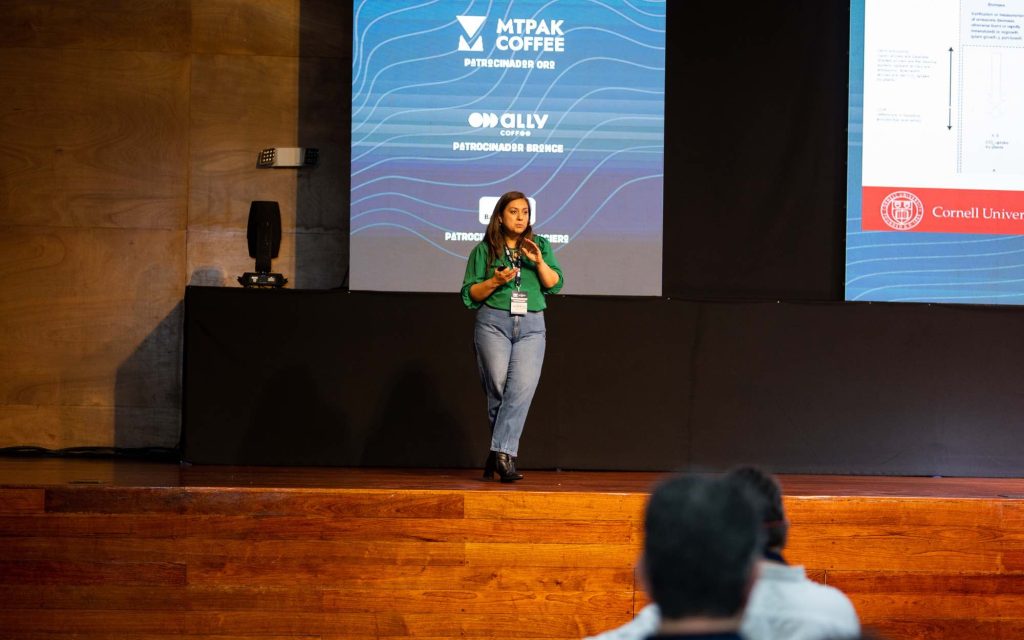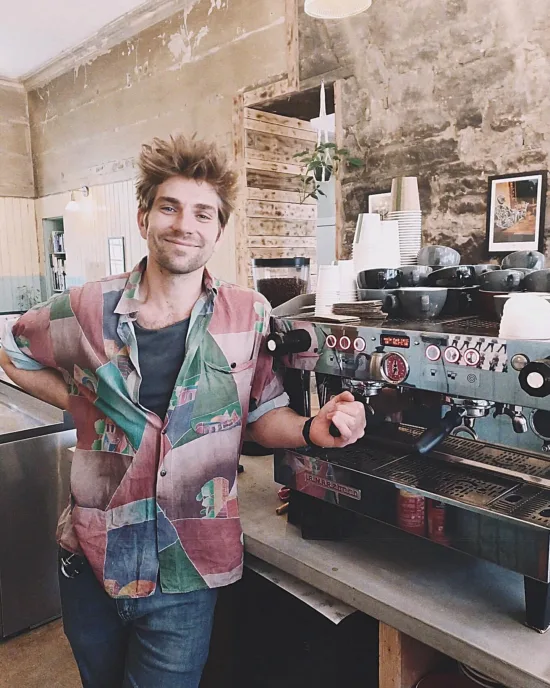The Malaysian capital is often visited in a hurry, but visitors who take the time to explore will discover a welcoming city, thanks in part to its friendly specialty cafés. BY TANYA NANETTI SENIOR ONLINE CORRESPONDENT Photos by Tanya Nanetti Kuala Lumpur, the capital...
Medium-sized farms play an important role in specialty coffee
Medium-sized farms play an important role in specialty coffee
Medium-sized farms play an important role in specialty coffee
Medium-sized farms play an important role in specialty coffee
Medium-sized farms play an important role in specialty coffee
Medium-sized farms play an important role in specialty coffee
Thread Coffee Roasters Opens Tailor-Made Roastery in Baltimore
The interwoven actions of Thread Coffee Roasters in Baltimore are finding exponentially more space this week with the grand opening of a brand-new production roastery and training lab. The worker-owned...
Toronto’s Pilot Coffee Roasters Acquiring Bridgehead Coffee for $3.6 Million
Toronto, Ontario-based specialty coffee roaster and retailer Pilot Coffee Roasters is acquiring Ottawa-based Bridgehead Coffee in a deal worth approximately US$3.6 million. Bridgehead, which has 21 coffee shop locations throughout...
Baking With Coffee For Beginners
This article is from the coffee website Sprudge at http://sprudge.com. This is the RSS feed version. Where to get started when introducing coffee to your bakes.
Bypass coffee brewing: How can it improve extraction?
There is a lot of science to brewing coffee. Whether knowingly or unknowingly, we trigger – and try to control – an almost endless number of chemical reactions to achieve the perfect extraction. To do so, we have to tweak different variables – such as grind size,...
Hawaiian Legislators Introduce Bills for Stricter Coffee Labeling
Legislators representing the Kona district of Hawaii have introduced a series of bills that would require more strict labeling requirements for single-origin coffees and blends containing Hawaiian-grown coffees. Some Kona...
New AFCA Director Gilbert Gatali on the 20th African Fine Coffees Conference
As the African Fine Coffees Association (AFCA) prepares for the 20th iteration of its flagship event, the African Fine Coffees Conference and Exhibition, the group is operating under new executive...
Philadelphia’s Café Don Pedro Seeks to Build Up Small Businesses
A Dominican-owned coffee roasting company called Café Don Pedro recently launched in Philadelphia with ambitions for direct trading and boosting more Latino-owned small businesses throughout its supply and distribution networks....
How much do you over-extract coffee in recipes?
This is sort of an odd question, but it's not a troll. While I love brewing specialty coffee, I also enjoy frappes (with or without ice cream). A major hurdle when using my espresso has been that while the final beverage tastes fine, the coffee is just too high...
Sprudge Maps Spotlight: Little Bear Coffee In Albuquerque, NM
This article is from the coffee website Sprudge at http://sprudge.com. This is the RSS feed version. Little Bear Coffee in Albuquerque, New Mexico.
Starbucks Will Hold their Own Barista Championship Thank You Very Much
This article is from the coffee website Sprudge at http://sprudge.com. This is the RSS feed version. The North American Barista Championship is expected to host over 15,000 Starbucks hourly workers.
What I Learned from My First Tea Ceremony
After taking in a brief moment of a tea ceremony in Thailand, I finally had the chance to participate in the full experience recently in Malaysia. BY TANYA NANETTI SENIOR ONLINE CORRESPONDENT Photos by Tanya Nanetti In the years that I worked as a barista in a café,...
Why it’s easier for wealthier producers to grow specialty coffee
It takes money – and sometimes a lot – to grow specialty coffee. Producers not only need to continuously maintain and improve quality and yields, but they also have to invest back into their farms. Whether it’s replacing equipment and machinery or planting more...
Does specialty Robusta exist?
Hello! Has anyone tried 'specialty robusta'? I work with specialty cacao, and I often observe Robusta shrubs being cultivated at lower altitudes alongside cacao trees. Some farmers are experimenting with carbonic maceration to enhance the marketability of...
[MOD] The Daily Question Thread
Welcome to the daily /r/Coffee question thread! There are no stupid questions here, ask a question and get an answer! We all have to start somewhere and sometimes it is hard to figure out just what you are doing right or doing wrong. Luckily, the /r/Coffee community...
The Sprudge Guide To Coffee Shops In Vancouver, BC
This article is from the coffee website Sprudge at http://sprudge.com. This is the RSS feed version. Where to drink coffee in Vancouver, British Columbia, Canada.
Coffee Machine (High density use)
Hi everyone, i am new in this coffee world and i am looking to buy me a coffee machine to setup a small business. I am looking for affordable machine that is good for high density use. Im open for any recommendation and opinion. Thank you guys! Here is what ive found...
Which to buy first?
Hi there, mostly a lurker until now. I'm trying to incentivize myself towards some goals and decided that rewarding myself with a better coffee set up upon reaching those goals would be great. I plan to get myself one nice thing when I reach my intermediate goal...
[MOD] The Official Deal Thread
Welcome to the /r/Coffee deal and promotional thread! In this weekly thread, industry folk can post upcoming deals or other promotions their companies are holding, or promote new products to /r/Coffee subscribers! Regular users can also post deals they come across....
The London Coffee Festival has just more than doubled its ticket price
Last year: £18 This year: £38 Unbelievable. It’s the same venue and same setup. I’m just an ordinary coffee fan and every year I spend a lot buying roasts and equipment there. submitted by /u/gahgeer-is-back [link] [comments]
Explain making good coffee to me like I’m 5.
Hi everyone, I’m not new to drinking coffee, but I’d like to start making it (well) at home myself. I’m totally clueless. I have an old Keurig that I rarely use, as well as a basic Mr. Coffee maker. Usually I buy dark roast ground coffee (I do like a good, strong cup...
Seeking instant test for rough caffeine level in coffee
About once a month, some inattentive barista gives me regular coffee by mistake, which is a bummer. I drink decaf. So when I get coffee at a cafe, I'd like to do an instant test of the rough caffeine level by dipping a strip into the coffee. Something analogous...
Questions/thoughts on cardamom-forward "thermal shock" processed coffees.
Hey everyone, Having a cup of Buttercream from September roasters and got to thinking. This is the second thermal-shock processed coffee I have had with this huge, distinctive cardamom note (The other being DAK milky cake which is also from Colombia, but from a...
Third Wave Coffee brands
Greetings to all, I am reaching out to this knowledgeable community with a query regarding the recognition of coffee brands within the third wave coffee movement. Is there an existing, publicly accessible list that categorizes and acknowledges coffee brands as part of...
Medium-sized farms play an important role in specialty coffee
For many consumers and industry professionals, specialty coffee and direct trade are inextricably linked. Building strong and mutually beneficial working relationships between producers and roasters is often seen as a cornerstone of establishing a truly sustainable supply chain.
So with this association between specialty coffee and direct trade, there can be a narrative of smaller-sized roasters forging long-term partnerships with smallholder producers to work closely together. Simultaneously, farmers require capital and resources to grow specialty coffee, so larger farms often have more capacity to invest in improving quality and yields.
Both of these examples are certainly true – with small and large farms playing a huge role in the global production of specialty coffee. So where does that leave medium-sized coffee producers?
To learn more, I spoke with Ana Sofía Narvaez, Relationship Builder at Caravela Coffee. Read on to find out what she had to share about the importance of medium-sized farms in specialty coffee.
You may also like our article on the reality of producing specialty coffee on very small farms.


How can we define a medium-sized coffee farm?
Categorising coffee farms of different sizes can be challenging. When it comes to smaller farms, it’s universally agreed that producers who farm areas smaller than five hectares can be defined as smallholders. This term accounts for around 95% of the world’s 12.5 million coffee farming families which contribute to 67% of global production.
Regarding areas of land larger than five hectares, however, it becomes more difficult to pinpoint exactly what size the farms are. Ultimately, it depends on the origin country itself, as scale of production is an important defining factor.
“A producer in Brazil who has a 25 ha farm is probably considered small scale,” Ana says, who is the Customer Relations Manager at Doselva – an organic spice company operating in Central America. “But in the context of Nicaragua, a farm of that size is medium.
“However, in the context of the same country, a producer with a 200 ha farm might think that a 25 ha farm is small,” she adds.
Another useful indicator of farm size is whether a producer carries out their own post-harvest processing practices on site, including:
- Processing (such as washed, natural, honey, or more advanced techniques) and drying
- Wet milling (removing the seeds from the flesh of the coffee cherry)
- Dry milling (removing the parchment from the beans)
- Hulling, grading, and sorting
Some smaller-scale producers may own or use micro mills, or alternatively transport their cherry to larger facilities to be processed by a third party. Medium and larger-sized farms, meanwhile, are more likely to operate or have access to bigger facilities which process and mill higher volumes of coffee.
Geographical context is still important here, however. Ana tells me that in Central America, for instance, many producers process their own coffee regardless of farm size.


Where do these farms “fit” into specialty coffee?
First and foremost, it’s incredibly important to emphasise that every farm that grows coffee scoring 80 points or over has a place in the specialty coffee industry – no matter its size or whether it processes its own coffee.
Specialty coffee often focuses primarily on smallholders – and rightly so. According to TechnoServe, more than 80% of the world’s 12.5 million coffee smallholder families live below the poverty line. Developing more long term, resilient relationships with and buying more coffee from these producers is an important step to improving their income, and thereby supporting them to increase quality and yields.
Meanwhile, it’s usually easier to see where larger farms can fit into specialty coffee. As these producers are considerably more likely to have more resources to hand and better access to capital, they can often invest more into improving the quality – or even trying new and advanced processing techniques more successfully with certain lots.
“In my experience, a producer who has a well-structured processing and drying station has a better chance of maintaining consistent quality standards with larger volumes of coffee sold as either commercial or specialty – depending on the market they operate in,” Ana tells me.
The level of coffee quality is ultimately dependent on each farm, its business goals, and access to resources and finance – so size can play an important role.
“Processing methods, weather conditions and terrain, access to technology, implementing best practices, and available varieties all need to be accounted for as well,” Ana adds.
Given that they will have more staff, medium and larger-sized farms are more likely to be able to control and manage these different variables more effectively – and thereby increase the volumes of specialty coffee they produce.
The ultra-premium market
Producers looking to enter the ultra-premium coffee market have to continuously innovate – whether it’s honing their processing methods or planting rare varieties. Trial and error is an essential aspect of this, alongside developing a thorough understanding of farming best practices.
Innovation, however, is an investment that not all producers can afford to carry out. Compared to other businesses in the supply chain, producers don’t typically hold much capital at any given time – especially smallholder farmers. This can mean that the risk of not recouping investment is much higher for smaller-sized farms.
Medium and larger-sized farms, conversely, sell more coffee based purely on their size. In turn, they are likely to generate more money and turn a profit to invest back into their businesses – providing them with more leverage to sell coffee in the ultra-premium market.
For producers looking to market their coffees to more high-end buyers, this can be one of the most effective methods. However, medium and larger-sized farms will still inevitably grow low 80-point coffees (or even below this score), which often make up a large portion of their total production volumes.


The advantages of buying coffee from medium-sized farms
There are, of course, benefits to sourcing coffee from farms of any size, but medium and larger-sized producers will naturally sell higher volumes – and potentially a wider variety of coffees, including different varieties and processing methods.
“These producers may also have more streamlined operations and have greater control over production costs,” Ana tells me. “They can also have better access to financing and credit for coffee production, and may have greater bargaining power when selling their coffee.”
Medium and larger-sized farms can, in theory, also implement changes to their farming practices more efficiently. The task may be too challenging (or even impossible) for some smallholders who have less access to capital, especially those who can’t risk a drop in quality or yields.
That’s not to say, however, that managing larger farms and bigger workforces isn’t difficult, too. With higher production volumes, producers need to hire more employees – including seasonal pickers – which requires more training and investment.


No matter its size, every individual coffee farm will experience its own unique challenges and advantages. And to best support the specialty coffee industry, roasters should endeavour to source coffee from a variety of producers.
But given the focus on smallholders and larger coffee farms, it can be easy to forget that medium-sized producers play an integral role in specialty coffee, too.
Enjoyed this? Then read our article on how we can improve access to finance for smallholder coffee farmers.
Photo credits: Caravela Coffee
Perfect Daily Grind
Want to read more articles like this? Sign up for our newsletter!
The post Medium-sized farms play an important role in specialty coffee appeared first on Perfect Daily Grind.





